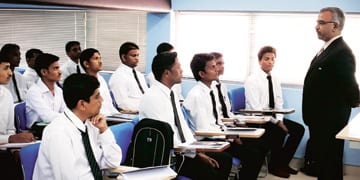Skill development transforms lives
Ministry of Tourism’s Hunar Se Rozgar Tak initiative is transforming the lives of many young men and women from Panvel, Pen and other Maharashtra villages, who are looking ahead to join the hospitality industry as cooks and in F&B services By Sudipta Dev
For Santosh Desale from Jalgaon in Mahrashtra, life turned completely within a few months, after he decide to do the six week course in F&B Service (waiter) under Ministry of Tourism’s Hunar Se Rozgar Tak (HSRT) programme. The young man, who used to do farming with his family in his village and earned almost nothing, is today working in The Park Navi Mumbai, earning a decent salary and looks ahead at life with great optimism. He is from the first batch of participants of HSRT free skill development programme that was launched about a year ago at Apeejay Institute of Hospitality in Navi Mumbai, in association with India Tourism Development Corporation (MoT, Govt of India).
Kiran Ashok Shelar who is also from the first batch of participants is working in the hotel with Dasale in the banqueting department. “There is a lot for me to learn after which I might go overseas,” states Shelar. Both Shelar and Dasale got the jobs in the hotel only after they were successful in the interview. “I have learned a lot, how to give good service to guests, do cluster set up, theatre set up in banqueting. I am getting a good salary now and I am happy,” states Dasale.
The six to eight week programme is offered to youngsters between the age of 18 to 28 years. The six week course in F&B Service (waiter) and housekeeping (housekeeper), and eight weeks course in food production (cook). The participants get free uniform and lunch and a stipend of Rs 1500 (six weeks) and Rs 2000 (eight weeks). Joint certification is awarded by Apeejay Institute of Hospitality and ITDC following the completion of the course.
Joining the organised sector
Acknowledging that mobilising people for the first batch was a challenge, Bhuvan GM, principal, Apeejay Institute of Hospitality, mentions once they understand the value of the programme they recommend it to others in the village. “They have come from an unorganised sector to the organised sector, which is a very good thing. The minimum wages have to be paid to them as per the rules of the government, along with PF, ESIC. Medical insurance, accident insurance, duty meals and doctor facilities are provided to them. Women get maternity leave,” informs Bhuvan.
From the current batch of food production, there are many girls who are from different villages in vicinity of Panvel area, mostly the PAP (projected affected people) of the upcoming international airport. These girls have been encouraged by CIDCO to do the programme, which might help them in getting a job. Quite a few of them aspire to become professional cooks and work in hotels and restaurants.
Manoj Patkar, associate professor and HOD (food production), Apeejay Institute of Hospitality, who also happens to be the course coordinator for HSRT programme, says, “Personality development is one key factor which we want to instill in them though it is not in their syllabus. The second important aspect is English speaking skills as we want them to be employable and crack the interviews.” He points out that most of the participants are clear about employment and are hard working. Attendance is almost 100 per cent.
The placement cell of the institute helps them in getting a job.“A few of them have however left the first job on account of hardships in the hotel industry, but we did not leave them there. We made them understand that the industry is tough, particularly for the first two years, and gave them another job offer,” adds Patkar. Those who were not ready to take up jobs in hotels are now working in QSRs, for instance McDonald’s in Kalamboli. A few are also placed in facility management companies.
Currently seven HSRT programme participants are working in The Park Navi Mumbai. Giving the employer’s perspective, Ravi Rawat, general manager, The Park Navi Mumbai says, “Many of those who were working with us have gone for better prospects. This shows the kind of willingness they have. They appreciate that the opportunity has given them a good future.” He believes that once people get to know about how the lives of those participating in the programme have been transformed, many more will get motivated.


